#cleopatra eurydice
Explore tagged Tumblr posts
Text
Cleopatra Eurydice

#studyblr#notes#history#historyblr#history notes#world history#world history notes#western civ#western civilization#philip II#cleopatra eurydice#macedonia#greece#ancient greece#olympias#europa#alexander the great#greek history#caranus#alexander of macedon#macedon#ancient macedon#cleopatra
20 notes
·
View notes
Text
im such a helpless romantic for old love stories with tragic ends, Ophelia and hamlet, orpheus and Eurydice, apollo and hyacinthus, achilleas and patroklos, apollo and clytie, Cleopatra and mark antony, nisus and euryalus, hermes and crocus just to name a few of these stories
#ophelia#orpheus and eurydice#apollo and hyacinthus#achilles and patroclus#apollo and clytie#cleopatra#mark antony#nisus euryalus#hermes and crocus#greek mythology#achilles
19 notes
·
View notes
Note
Would Alexander have really married Cleopatra Eurydice? He seems to have respected her enough despite her relation to Attalus- some sources say when removing her statue from the Philippeum he transferred it to another respected place in Heraion. Did they get along personally? How would their marriage have changed matters, if at all?
Did Alexander Mean to Marry Kleopatra Eurydike?
Okay, first, I believe we have a confusion/conflation of Eurydikes. The one from the Philippion is Philip’s mother, wife of Amyntas III. Her statue was never removed out by Alexander, so I’m unsure what the asker is referring to? The statues were lost over time, but we have the statue bases, and descriptions of the monument. See especially Elizabeth D. Carney, “The Philippeum, Women, and the Formation of Dynastic Image,” in W. Heckel, L. Tritle, and P. Wheatley (eds.) Alexander’s Empire: Formulation to Decay (Claremont, CA, 2007) 27-70. For Eurydike herself, see Olga Palagia, “Philip's Eurydice in the Philippeum at Olympia,” in E. Carney and D. Ogden (eds.), Philip II and Alexander the Great (Oxford 2010) 33-41.
“Eurydike” became a dynastic name, so it keeps popping up among Argeads (and later). Philip’s mother was Eurydike, as was his daughter, wife of Philip III Arrhidaios: (Hadea) Eurydike. Also Kleopatra, niece of Attalos, took the name Eurydike when she married Philip. But she was never in the Philippeon. Philip’s only wife represented there was Olympias, mother of his heir, Alexander. Amyntas III and Eurydike appeared as his parents.
We have no idea if Alexander shared more than a few words with Attalos’s neice. Given her uncle’s hostility towards him, he would likely have minimized contact. Also, timing was against it. Alexander left on the heels of the marriage, was gone 6 months to a year, then likely kept his distance after his return. While Macedonian women were not as sequestered as in Athens, men and (respectable) unrelated women still didn’t mingle freely. If he did interact with her, it would have been when visiting the women’s rooms to see his sisters, with plenty of women present. If marrying a dead father’s widow had precedent, an affair with the wife of one’s living father was another thing. Alexander knew his mythology, and would’ve had no desire to be Hippolytos.* After he took the throne, he had to leave relatively quickly to settle affairs in the south…and she was (likely) dead before he returned.
As for the marriage… this was suggested by my colleague, Tim Howe: “The Giver of the Bride, the Bridegroom, and the Bride,” in T. Howe, S. Müller, and R. Stoneman, Ancient Historiography on War and Empire (Oxbow, 2017) 92-124. Nothing in the ancient sources says Alexander planned such a marriage BUT marrying the wife (especially if young) of the former king wasn’t novel in Macedonia; Archelaos did the same. It was accepted practice generally.
The titbit that might suggest Alexander did plan to wed Kleopatra-Eurydike … Olympias murdered her.
Now, ignoring Justin’s account of a son Karanos, which is wrong (for reasons I don’t have time to go into), Kleopatra-Eurydike’s child was a girl (Europa). That means Kleopatra had no power in the women’s rooms after Philip’s assassination. So why the hell would Olympias kill the infant (and her, by extension)? Revenge alone?
Possibly. Revenge, especially for a slight to timē (personal honor), was a perfectly respectable reason to kill someone. “Turn the other cheek,” or “When they go low, we go high,” is a very Christianized view. But an even better revenge would have been to let her live to raise an extra daughter under the king her uncle had insulted and schemed to replace. Philip had 3 prior adult/almost adult daughters. A 4th, well over a decade from marriageability, was a day late and a dollar short. She could expect a miserable existence in the Pella palace where she was no threat to Olympias.
Unless Alexander planned to marry her in a diplomatic solution to suppress Attalos’s faction, and secure Parmenion’s support. (Attalos had married Parmenion’s daughter.) I strongly suspect Philip’s final marriage was not the midlife-crisis love match Plutarch/Diodoros present, but an attempt to deal with push back in his latter years. Alexander may have decided that marrying the girl was the best way to deal with it too.
And if Alexander did plan to marry her, she was a threat to Olympias’ influence. This isn’t necessarily jealousy. Olympias may have decided that wooing the snake wasn’t sound policy. Remember that Alexander was barely twenty and Olympias would have been between 36 and 38, with oodles more political experience. While sure, her move was self-serving, it also may have been sound policy to keep her son from the match. (Two things can be true at once.)
Alexander need not have publicly declared an intention to marry his father’s widow; he had bigger fish to fry in the immediate aftermath. Yet if he’d discussed it privately, his mother may have moved to eliminate the possibility while he was out of the country. The brutality of the murder certainly suggests a vengeance theme.
Incidentally, while the death of Europa at Olympias’s hands (and Eurydike’s subsequent suicide) is not securely dated in our sources—except that Alexander wasn’t in Pella—it almost certainly occurred in the first months after Philip’s death, during Alexander’s first trip into the Greek south, to shore up support for the Persian invasion and re-ratify the Corinthian League.
As for how their marriage may have changed things…it would almost certainly have put Alexander under the thumb of Attalos-Parmenion. We can see, in the appointments of his two sons, that Parmenion alone held great sway in Alexander’s early years—but at least he wasn’t an in-law. For once, Olympias and Antipatros were likely on the same side. (Antipatros and Parmenion weren’t precisely friendly.) If, as I suspect, Philip made that marriage for political reasons, it suggests the Attalos faction—whatever that entailed—was strong enough to force Philip’s hand before leaving on a probable long-term campaign. That means Attalos was powerful. And a 20-year-old Alexander was no match for him, even if adolescent arrogance may have made him think he was. Olympias may also have decided/suspected that the Attalos-Parmenion tie wasn’t as strong as Alexander feared—which proved to be true. When push came to shove, Parmenion allowed Attalos to be eliminated on Alexander’s order.
Arrian glosses over all this. I wish we had the first two books of Curtius, who likely covered the story of Alexander’s accession in more detail. It would provide more clues. Attalos sorta comes out of nowhere at the end of Philip’s life. Although Diodoros’ account of his reign is so truncated we don’t know the marshals under Philip well, so he may have been around longer than it seems.
————-
* Alexander knew his mythology. Theseus’s second wife, Phaidra, was reportedly cursed to conceive a passion for her (more age-appropriate) son-in-law, Hippolytos. Yet Hippolytos had pledged his virginity to Artemis, offending Aphrodite, who was behind the curse. When Hippolytos rebuked poor Phaedra’s advances, she suicided, leaving a note implicating Hippolytos (for rape). As punishment, Theseus asked his father Poseidon to kill his son. While out in his chariot, a sea monster spooked the horses, he fell out the back but got tangled in the reins, and they dragged him to death. A variation exists in which Aisklepios brings him back from death but Hades is so offended/(worried) by this power, he asks his brother Zeus to strike down Aisklepios by lightning…which he does. One of the few cases of a god dying. (They’re immortal, yes…but can be killed; it’s just that few things can kill one. Being fried by lightning will do it.)
#asks#Kleopatra-Eurydike#Alexander the Great#Philip II#Attalos#Attalus#Cleopatra-Eurydice#Olympias#Macedonian marriage#Parmenion#ancient Macedonia#Alexander the Great's early years#ancient Greece#Classics
11 notes
·
View notes
Text
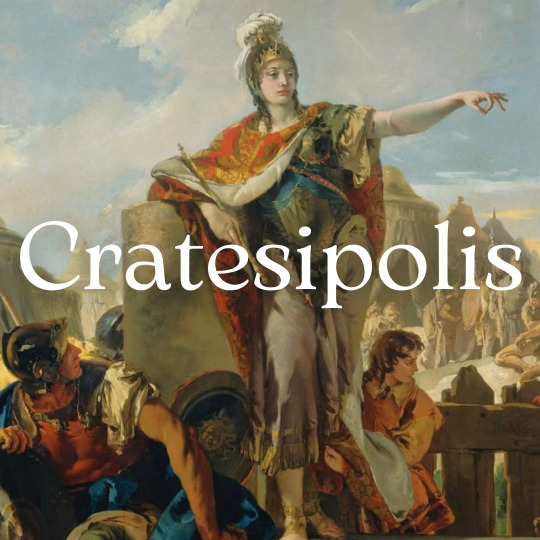
"After the death of Olympias, Macedonian troops were commanded by yet a third woman general during the struggle of the successors: Cratesipolis. Cratesipolis was the wife of Alexander, son of the regent Polyperchon, who had been Olympias’ ally. Alexander first appears in the historical record in 317, towards the end of his father’s regency and at the climax of the struggle between Olympias and Adea Eurydice. Naturally he was an ally of Olympias vis-à-vis his father, Polyperchon. Following the death of Alexander the Great, Polyperchon had managed to control portions of the Peloponnese, particularly the ports of Corinth, Sicyon, and Patrae (Diod. 19.35.1; 54.3). In 317 BCE, this Alexander, the son of Polyperchon, was poised to attack Cassander, who himself was besieging Tegea. Cassander sped to Macedon, however, when he heard that Olympias had deposed Adea Eurydice and Philip III. After the death of Olympias, Alexander continued to fight Cassander but eventually switched over to Cassander’s side when Cassander offered him generalship over the Peloponnese, the prize for which he was fighting anyway.
Alexander’s wife, Cratesipolis, was highly esteemed by her husband’s army because she distributed largesse to those in need (Diod. 19.67.1). In 314 BCE, Alexander was assassinated by revolutionary Sicyonians, but Cratesipolis bravely assumed the command of Alexander’s troops and quelled the rebellion (Diod. 19.67.1–2). The Greek Sicyonians thought they had nothing to fear from a woman, and were surprised when Cratesipolis and her forces defeated them. Whereas the Greeks of Sicyon—like those in earlier Rhodes or Aeolis—were loath to be ruled by a woman, once again we see that Macedonian soldiers were willing to take orders from a woman commander. Like her male counterparts, Cratesipolis was shrewd. Whereas Plutarch (Demetrius 9) tells us that she was renowned for her beauty, Diodorus (19.67.2) relates that Cratesipolis was intelligent and possessed “daring [tolma] beyond that of a woman.” Writing almost 400 years later than Thucydides, Diodorus still saw tolma as a male quality, at least the kind of tolma needed to engage in warfare.
Nothing is known of Cratesipolis’ origins or family. Macurdy suggests that she was of the Macedonian nobility, since she married Alexander, the son of a high-ranking Macedonian official, the regent Polyperchon. Her name, Cratesipolis, is found on inscriptions in Larissa in Thessaly, perhaps suggesting a Thessalian origin. Or her name may have been awarded later in life, just as Olympias, Myrtale, and Stratonike were names given by the Macedonians to Alexander’s mother, who was originally called Polyxena (Plut. Mor. 401b). Cratesipolis does mean “ruler of the city,” after all.
Cratesipolis ruled the poleis of Patrae, Sicyon, and Corinth for seven years, but ultimately handed over Sicyon and Corinth to Ptolemy I, perhaps hoping that he would marry her (Diod. 20.37.1; Polyaen. 8.58). She was also no match in terms of military strength for Ptolemy, whose resources and wealth were certainly far greater. Ptolemy, however, tried to woo Cleopatra, the sister of Alexander the Great. Cleopatra was murdered by Antigonus’ machinations, and Ptolemy’s plan was ultimately frustrated. Marriage to Cleopatra might have included the throne of Macedon as a dowry, and Ptolemy was more interested in a royal bride than in Cratesipolis. Cratesipolis then tried to woo Demetrius, another of the warring successors and the son of Antigonus, also with no success as he was almost killed by his enemies trying to meet her, and was forced to flee (Plut. Demetrius 9). We do not hear of Cratesipolis successfully remarrying, nor do we hear anything of her after the incident with Demetrius. Despite her obscurity in both life and death, Cratesipolis’ ability to both govern cities and command armies places her among the ranks of an Olympias or Adea Eurydice."
Postcolonial Amazons, Female Masculinity and Courage in Ancient Greek and Sanskrit Literature, Walter Duvall Penrose
#history#women in history#women's history#historyedit#cratesipolis#warrior women#women warriors#historyfacts#antiquity#ancient world#ancient macedonia#macedonian history#4th century BCE#macedonia#female rulers
68 notes
·
View notes
Text

❝𝐖𝐄 𝐀𝐑𝐄 𝐀𝐋𝐋 𝐅𝐎𝐎𝐋𝐒 𝐈𝐍 𝐋𝐎𝐕𝐄❞ welcome to kentopedia's love through the ages collab. in honor of another lonely valentine’s day, i wanted to combine my two greatest loves: history and literature! so this is for anyone who wants a passionate romance and loves the aesthetics of the past. because i know that no matter when you live and die, your favs will always choose you ♡
STATUS: CLOSED

♛ — TO JOIN
submit a piece based off a time in history you find interesting. it can be an au of your favorite classic novel, a song you enjoy from a period before your own, a piece of art you enjoy, or something entirely your own. be creative!!
please reblog this post & send me an ask with the character you'd like to write about and the inspiration. for example: "nanami + renaissance" (which is what i’ll be writing teehee).

♛ — REQUIREMENTS
no fandom limitation, but i will cap it off at 2 entries per character (i won’t count mine in that limit!). and you can join as many times as you want.
this is a historical au collab, so i will not accept any submissions based in the 21st century :) but it can go back as far as you want!
there is no deadline. minimum of 500 words, but no maximum. i love long fics! please use the read more feature on your posts.

♛ — OTHER
anyone can join, this is not limited to followers. no age requirement, but you must be 18+ to submit nsfw pieces, with an age indicator. make sure to follow the rules of all creators involved (including me!).
submissions can be as historically accurate or inaccurate as you want them to be, and could include fantasy elements too! this is all about capturing the aesthetics of a time period, but i will never limit anyone’s creativity. it can be extremely niche too!
all forms of art are welcome, not just writing, as long as they are of your own creation.
nsfw, sfw, dark content, etc. is all acceptable. be sure to tag accordingly!

♛ — TO SUBMIT
tag me in your submission so i can also add you to the masterlist. also, link this post on your submission to spread the love to other readers! i will be reading all the submissions and reblogging with feedback as well. let me know if you have any questions!

bungo stray dogs . . .
nakahara chuuya and post wwii yakuza by @cheriiyaya
nakahara chuuya and the 1800s italian mafia by @osaemu
dazai osamu & fyodor dostoevsky as rival painters in the renaissance by @aureatchi
dazai osamu & fyodor dostoevsky in the trojan war by @fyorina
fyodor dostoevsky and victorian era royalty by @verlainepaul
dazai osamu as a fallen angel by @chuuyrr
jujutsu kaisen . . .
nanami kento and the renaissance by @kentopedia
okkotsu yuta as an edo period samurai by @anqelically
gojo satoru & geto suguru and the medieval period by @flowerpersephone
geto suguru as a nineteenth century vampire by @todorokies
nanami kento and the victorian era by @starsinmylatte
gojo satoru and orpheus and eurydice by @forest-hashira
geto suguru and the american old west by @forest-hashira
geto suguru and phantom of the opera by @mynahx3
geto suguru and ancient greece by @mochimooon
nanami kento and the heian period by @purpleqilinwrites
fushiguro toji as a medieval bandit by @honeybleed
true form sukuna ryomen and ancient greece by @girlwithsharpt33th
okkotsu yuuta and post apocalyptic 1600s by @atsquie
nanami kento as a medieval knight by @mynahx3
nanami kento and the regency period by @kentopedia
nanami kento and ancient japan by @mynahx3
attack on titan . . .
reiner braun as a wwii soldier by @thel0v3hashira143
levi ackerman and the impressionist era by @be-co-me
armin arlert and the early 20th century by @crazychaoticizzy
eren jaeger and the age of piracy by @bloompompom
demon slayer . . .
shinazugawa sanemi and antony & cleopatra by @mitsuristoleme
tengen uzui and the roaring 20s by @forest-hashira
haikyuu . . .
kuroo tetsurō and the space race by @ktsumu
kuroo tetsurō & iwaizumi hajime in regency era inspired japan by @jarjarwinx
persona 5 . . .
akira kurusu and the prohibition era by @clubkira
genshin impact . . .
albedo as a renaissance artist by @clubkira
dainsleif in the greatest showman by @rubysm
blue lock . . .
noel noa and indonesian colonization by
#𝓵𝓸𝓿𝓮 𝓽𝓱𝓻𝓸𝓾𝓰𝓱 𝓽𝓱𝓮 𝓪𝓰𝓮𝓼 𝓬𝓸𝓵𝓵𝓪𝓫 ❤︎#painting in graphic romeo and juliet by frank dicksee :)#if no one joins … pretend u never saw this.#jjk x reader#aot x reader#csm x reader#jujutsu kaisen#attack on titan#haikyuu#x reader#jjk x you#aot x you#haikyuu x you#haikyuu x reader#bungo stray dogs x reader#bsd x reader#bsd#bllk x reader#bllk x you
268 notes
·
View notes
Note
"5. What's the first song that comes to mind when you think about them?"
This with Lee and Will, especially, but I'm actually very curious about all of cabin seven. As a whole and individually
oh baby you are going to be Mad. i need you to imagine will making these songs for his brothers:
Michael by Jenn Grant (spotify) (youtube)
Lee by Unloved (spotify) (youtube)
Lee by Nina Nastasia (spotify) (youtube)
amazing and awful things happen when you look names up on spotify. highly recommend. i am currently looking for diana and cass and i will reblog this when i have them.
IN ADDITION music that is v will coded i have a whole playlist actually. its for the road trip au 👀👀 and some of it is will singing in my head and some of it is him covering, but its here!! im working on it actively.
WHEN i think of this one-off part (not one-off i tried to write it causally but he fucking occupies 72% of the space in my brain so bad so constantly) i wrote:
"He says it quiet like he does at the campfire, when it’s only the older kids left but she’s managed to stick around, holding her breath so they won’t notice and send her away. When Will lies back on a log and matches his breathing to the flames, eyes unseeing, and Annabeth watches him carefully and whispers, “Play us something, Will.” And he picks up the guitar he keeps dusty under his bed and sings something soft like there’s no hardness left inside him. No bowstring."
i am feral and i have several songs that i think will would sing here:
Drown Me by Dasha (spotify) (youtube)
girl i've always been by Olivia Rodrigo (spotify) (youtube)
All I've Built by Holden Miller (spotify) (youtube)
i also feel like will & kayla & austin sing What Is This Feeling? from the Wicked Soundtrack (spotify) (youtube) when they're tense & need to laugh during long infirmary shifts & other nerds join in LOL
not will or cabin 7 but No More ?'s by Eazy-E (spotify) (youtube) is a song percy listens to just All the time
I ALSO sometimes think will is so repressed he could just Let Loose and write something mad and hurting and just explosive. these are the songs (they are mostly demi lovato who i feel has a lot or parallels w will actually):
Give Your Heart A Break (Revamped) by Demi Lovato (spotify) (youtube)
Heart Attack (Revamped) by Demi Lovato (spotify) (youtube)
Beautiful Things by Benson Boone (spotify) (youtube) *look i know its overplayed now but when i was assigning it to will it was brand new LOL
most of HOLY FVCK by Demi Lovato (spotify) (youtube) (ESPECIALLY City of Angels)
i have in depth lore for all of these btw. like entire storylines about them feel free to ask me about them
some misc songs that make me think of will or solangelo (a lot for naomi tbh yall'll see) or the likes:
Cleopatra by The Lumineers (spotify) (youtube) (will made song)
After Midnight by Chappell Roan (spotify) (youtube) (will made song)
Good Luck, Babe! by Chappell Roan (spotify) (youtube) (naomi made song)
Slow It Down by Benson Boone (spotify) (youtube) (song makes me think of solangelo)
Dandelions by Ruth B. (spotify) (youtube) (will made song)
Orpheus by Vincent Lima (spotify) (youtube) (song makes me think of cabin 7)
Eurydice by Vincent Lima (spotify) (youtube) (song makes me think of cabin 7)
Hair Toss, Arms Crossed by Mark Ambor (spotify) (youtube) (song makes me think of solangelo)
Austin by Dasha (spotify) (youtube) (naomi song)
Dying Star by Ashnikko (spotify) (youtube) (will made song)
Suneater by Leanna Firestone (spotify) (youtube) (song makes me think of solangelo)
July by Noah Cyrus (spotify) (youtube) (song makes me think of solangelo)
Line Without a Hook by Ricky Montgomery (spotify) (youtube) (ong makes me think of solangelo
Summer by Kesha (spotify) (youtube) (song makes me think of solangelo)
#headcanon#pjo headcanon#songs#I LOVE MUSIC#this was so fun ive been wanting to yap about this for forever#IM ANSWERINT THE OTHER ASKS PROMISE#THIS ONE JUST TOOK ME FOREVER TO WRITE LMFAO#ask#longpost
27 notes
·
View notes
Text
Lynkestis, Macedonia, Greece
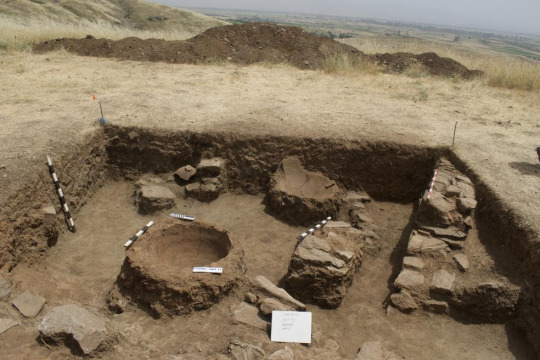
Source: https://now.humboldt.edu/news/humboldt-archaeologists-help-uncover-ancient-city
Originally thought to be a military outpost to protect against invading Roman forces, researchers have found a city in Northern Macedonia that dates back much farther, to the time of Alexander the Great and perhaps even into the Bronze Age. Initially, they thought the site only dated back to King Philip V's reign (221-179 BCE), but they found coins minted between 325-323 BCE, which is during the lifetime of Alexander the Great, and even ceramic vessels and axe fragments that date to the Bronze Age (3300-1200 BCE).

Source: https://now.humboldt.edu/news/humboldt-archaeologists-help-uncover-ancient-city
In addition to the fortifications, researchers have found a Macedonian-style theater and a textile workshop among others, with coins, game pieces, a clay theater ticket, and textile tools being found among the buildings. These findings highlight 'the complex network and power structures of ancient Macedonia, especially given the city's location along trade routes to Constantinople. It's even possible that historical figures like Octavian and Agrippa passed through the area on their way to confront Cleopatra and Mark Antony at the Battle of Actium' one of the researchers said.

By Drawing by Marsyas - Data from M. Hatzopoulos: Macedonian Institutions under the Kings, Athens, 1996., CC BY-SA 3.0, https://commons.wikimedia.org/w/index.php?curid=59915
Additional studies of the area have been done by drone-deployed LIDAR as well as ground penetrating radar, allowing researchers to focus their studies as well as mapping the city. With the location and size, researchers think this city might be the city of Lyncestis, the birthplace of Queen Eurydice I, Alexander the Great's paternal grandmother, who was the center of a plot against her husband Amyntas III. She was one of at least two wives, becoming the dominant one at some point. Her life also marks the first time in Macedonia that the life of a queen or princess was important to the course of politics. She conspired with her son-in-law Ptolemy of Aloros, with whom she was likely having an affair, to kill her husband. Her daughter revealed the plot to Amyntas, though he didn't punish Eurydice. When he died, her eldest son took the throne. He was killed by Ptolemy even though the two had a truce. Ptolemy was forced to agree that he would be regent to Eurydice's other sons rather than rule in his own right. Eurydice later married Ptolemy, though if this was voluntary or not is unclear, though it ensured her remaining son's place in the line of succession. She also persuaded Iphicrates, an Athenian general who was adopted by Amyntas, to protect her sons against Pausanius, who was attempting a coup for the throne of Macedonia. This act was unprecedented act for a royal woman to seek foreign aid to protect the royal line of succession. Her plan was successful, with her second son, Perdiccas III avenging his brother's death and taking the throne, though this act led to Philip II being taken hostage by Thebes. Perdiccas over extended himself against Athens and was killed, leaving Philip II to eventually take control of the kingdom.
7 notes
·
View notes
Text
“So like Orpheus and Eurydice?”
He scowled at the comparison. “No. She succeeds where he doesn’t.”
Cleopatra laughed. “Apologies, dearest. Forgive me?”
And oh, how could he refuse such a thing when she looked so enchanting? “You’re very lucky that you’re pretty.”
“You think I'm pretty?” she teased.
“I think you put all the flowers to shame when you stand next to them.”
#oc: hector dovecote#oc: cleopatra dovecote#in a hector and cleo mood tonight~#medea writes#dovecote family thoughts#hector and cleopatra... beloved ♥️
9 notes
·
View notes
Text




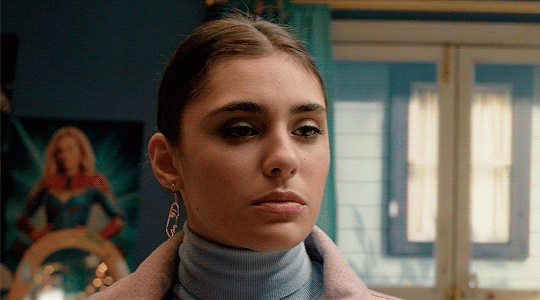
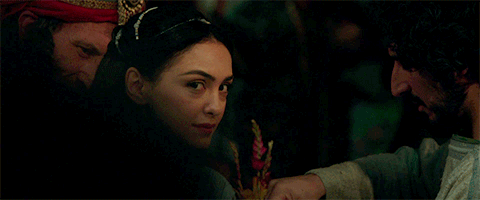
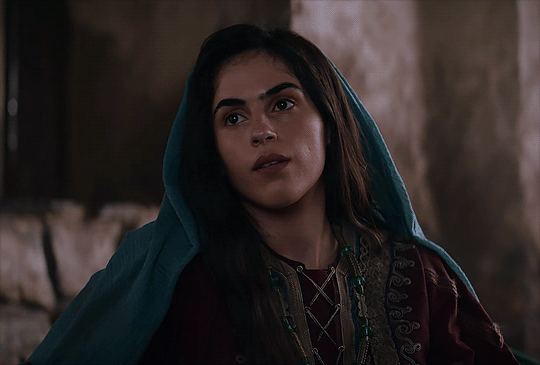

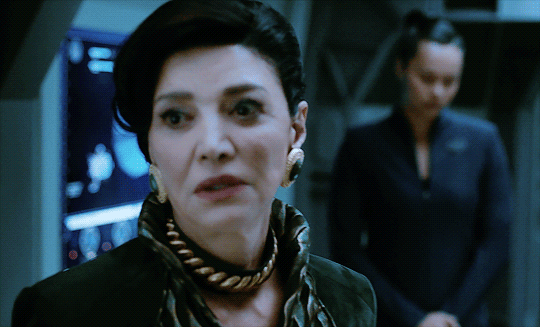
Alexander The Great Roxana
Stateira I Drypetis
Parysatis Stateira II
Olympias Sisygambis
Hephaestion Darius III
Philip II of Macedon Cleopatra 'Eurydice' of Macedon
Cleopatra of Macedon








Fan cast Alexander The Great remake
#alexander the great#fan cast#jeremy allen white#havana rose liu#golshifteh farahani#yasmeen fletcher#nazanin boniadi#leem lubany#jennifer aniston#shohreh aghdashloo#Sebastian Croft#Theo James#Fahim Fazli#Ali Olomi#Zach Galifianakis#Ariane Labed#Adèle Exarchopoulos
31 notes
·
View notes
Text
𝐋𝐨𝐯𝐞 𝐜𝐨𝐬𝐭𝐬 𝐢𝐭 𝐚𝐥𝐥
I write poetry because love bleeds,
Like Juliet’s sigh, her final breath,
A tale of two hearts, doomed by need,
That led them both to death.
I write only because Eurydice fades,
In Orpheus’ glance, hope falls away,
The strings he pulled through shadowed glance,
Can’t stop her from decay.
I write for Tristan’s dying gaze.
I write for Cleopatra’s crown,
And Antony’s sword, lost in gloom,
The hurt that strikes as kingdoms drown,
Beside a lover’s tomb.
I write because Paris still burns,
For Helen, the spark of Troy’s fall,
Her beauty’s curse, as fortune turns,
And ruins one and all.
I write for Leander’s cold sea,
And Hero’s leap into the deep,
Two souls lost to eternity,
Where stormy waters weep.
I write because love always calls,
Through broken vows, through blood and tears,
In every verse where sorrow falls,
I write to bind those years.
I write because love, the greatest victory,
is same as the worst fall.
I write because I love,
And love costs it all.
#writers on tumblr#artists on tumblr#art#poets of tumblr#english literature#poems on tumblr#poets of instagram#original poem#poems and poetry#poetry#thisiwilldecidelater
8 notes
·
View notes
Text
“You know Aphrodite, you’re nothing like they say.” I tell you.
“What do they say?” You ask me, a knowing smile on your face.
“That you created love and snatched it away from us.” I explain, sadly.
“My love, you don’t even understand what love is. I have spent eternity watching humans disparage the most terrifyingly beautiful power in the universe and reduce it to something nondescript and simplistic and then blame me for it.” You say, still calm but there is a hint of sadness in your voice.
“Then what is love?” I ask with wide eyes.
You brush your hair off your face and sit me down.
“Love is a lot of things. Love is tragedy, or so we saw in Troy. It is self-destruction, for Romeo and Juliet died. It is reckless and impulsive like Guinevere and her knight. It is heartbreaking, blinding and wild, like Antony and Cleopatra and the story of their life. Love is also devotion, when Orpheus went to the underworld for Eurydice. It is faith, it is trust, as in Bonnie and Clyde. Love is brave, like Achilles and Patroclus. it is comfort, it is home, it is perhaps a shred of truth, in a sea of lies.
love is a lot of things, but it is not quiet. So, yes, the reality of love may be very rare.
But it will remain that way until it’s true price is realised. Until the lovers from the afterlife, deem somebody worthy of feeling everything that they lived for, and worthy of everything for which they died.”
- aphrodite isn’t vain and selfish, we just need someone to blame for our misunderstandings.
(tales from the afterlife #5: aphrodite)
#writers#love#poetry#writers on tumblr#art#feelings#poems on tumblr#poetry community#poets of tumblr#spilled ink#greek mythology#aphrodite#icarus#conversation#afterlife#greek poetry#greek gods#greek myth#writers of tumblr#writing blog#patrochilles#achilles#history#lovers#patroclus#bonnie and clyde#star crossed lovers#romeo and juliet#shakespeare
98 notes
·
View notes
Text
So here's something I've learned from my Age of Antiquity D&D campaigns I'm running at the library: I can take pretty much anyone I want from ancient history and bring them into the campaign with magic. The current campaign is in the Roman Empire in 180 AD, and I've got Queen Olympias and Ptolemy I as vampires, Queen Adea Eurydice who was trapped for a few hundred years in a magic prison and has spent the last 230 years hunting Olympias, and I'm thinking about bringing Cleopatra VII in for the final session next week.
Plus, I get to info-dump on one of my hobbies every time someone succeeds a History check!
19 notes
·
View notes
Text
(sorrowful and wistful eccentric professor voice) Ah yes the great classics of ill fated love...Orpheus and Eurydice, Romeo and Juliet, Tristan and Isolde, Nisus and Euryalus, Anthony and Cleopatra, Pyramus and Thisbe, Dean and Cas,-
20 notes
·
View notes
Note
Is it true that Alexander was against is baby sister Europa being killed? Or did he not know/have an opinion about it?
Olympias and the Murder of Europa
We don’t know when Olympias killed Kleopatra and baby Europa. Probably sooner rather than later; that is, on Alexander’s initial trip to south Greece, after he took the throne. By all accounts (and there aren’t many) he wasn’t in Pella when it happened. Plutarch tells us he was furious upon his return. He probably was, but not just because of the cruelty.
Tim Howe has an interesting theory in “Cleopatra-Eurydike, Olympias and a ‘Weak’ Alexander,” which suggests he’d intended to marry Kleopatra himself. This wouldn’t be the first example of a Macedonian king marrying the young widow of the prior king. Same thing happened with Archelaos who married the widow of his father Perdikkas II. (Ironically, she was also a Kleopatra.) Archelaos then killed his (unnamed) seven-year-old rival half-brother by Kleopatra. Although we can’t be 100% certain it’s the same woman, the likelihood is very high. We don’t know if the marriage occurred before or after he killed the boy. He then had a child himself by Kleopatra (which child, in turn, was murdered after Archelaos’s death and never took the throne).
Welcome to Macedonian politics.
In Alexander’s case, he wouldn’t have needed to kill the infant girl, as she was no threat. But by marrying his father’s widow, he could actively ‘perform’ his announced, “Only the name of the king has changed,” and secure political alliances before marching for Persia.
Yet a potential marriage on the horizon would be a very good explanation for Olympias’s action. On the face of it, the murder seems unduly vicious. An infant girl was, again, no threat—nor was Kleopatra herself. Perhaps Olympias did it purely for retribution, but she rarely acted for “mean” reasons. Killing Kleopatra suggests she was somehow still a threat. Why? Her uncle, Attalos, couldn’t be king (not an Argead), and her child was female. Why kill the widow?
Unless Alexander intended to marry her. What Alexander may have seen as good policy for him was a serious threat to Olympias’s own status. So she eliminated that option.
That would also explain Alexander’s apparent fury. Yes, he probably was horrified by the murder of an infant, but children under a year old already occupied liminal status, waiting to see whether they’d survive to their first birthday. I don’t mean that to be dismissive, but Europa’s life, or death, didn’t impact him much, politically. He may have seen her only a handful of times, so she was probably “nebulous” to him, his emotional reaction generic rather than specific.
His mother being responsible for the death of his father’s widow, however, DID impact him politically, upending any decision to marry her, plus requiring him to eliminate Attalos, who now had a blood feud with him. Supposedly, Attalos tried to tender an olive branch, but probably before he had news of his niece’s murder. So Alexander’s choice to have him assassinated (with Parmenion’s acquiescence) was a political choice necessitated by Olympias’s actions.
It would have been quite a mess, from a diplomatic POV. Olympias acted to safeguard her own security at court. But that, in turn, upset Alexander’s own plans, forcing him to reposition himself, leaving him desperate for Parmenion’s support, leading to high appointments for both Parmenion’s elder sons. It may have been the first serious (political) clash between mother and son. If normally, a mother’s fortunes in polygamous situations depended on her son’s, not always. Here, we see Olympias securing her own position by eliminating a rival…even if that then complicated her son’s political options.
The end result is that Alexander didn’t marry anybody before leaving for Asia.
Given his short life, that, in turn, resulted in a succession problem upon his death. Nobody could have foreseen as much in 336. Sometimes, you’re just trying to stay alive. But it had long-term consequences.
#asks#Olympias#Kleopatra-Eurydike#Cleopatra-Eurydice#Macedonian politics#ancient Macedonia#ancient Macedonian inheritance#Alexander the Great#Philip II of Macedon#Classics#polygamous courts
20 notes
·
View notes
Note
idk if you already did this and i just forget, but makoharu, who is orpheus and who is eurydice? you've made hadestown references before in the duration of our greek myth mh au exchanges but i don't recall if you've made a real mh orpheus-eurydice talk before.
also the "makoto/kiyofumi = patroclus/cleopatra" parallel also works in haru/azuma = achilles/meleager. achilles' name is derived from the greek word for pain, achos, and haru's full name means "seven currents away" literally (nanase- seven currents; haruka- distant, remote, away) or "great isolation". meanwhile their counterparts, once glorious people who have fallen out of glory, azuma's name ryuji means "imperial ruler", and meleager means "he who was part of the hunt" (his fame comes from his participation in the calydonian boar hunt).
i think there's something about how haru and achilles are both destined for a life of glory, but also for a life of grief and pain and suffering (as their name suggests) at the same time, and then there's azuma and the king who were both destined for glory, but ended in grief and pain and suffering not bc of destiny, but bc of their choices (idk i'm kinda reaching here)
this time the connection is haru/achilles = azuma/meleager (since in the first place achilles and meleager have different etymologies that happen to somehow correspond with haru's and azuma's, respectively. whereas patroclus and cleopatra share the same etymologies, and makoto and kiyofumi also have some similarities in the meanings of their names, that makes it makoto/kiyofumi = patroclus/cleopatra). either way, the parallels still work bc all four names make a connection.
i just realized how both canon and mook haru have some similarities w/ tsoa achilles in the way that both are willing to let other people in peril if it means the safety of their beloved. haru was mad at rei bc if it hadn't for him makoto wouldn't have been in danger like that. no implication that makoto should have left rei to drown to death, but if we consider the mook where haru directly attempted to prevent makoto from saving a potentially trapped victim (a child at that!) just so he wouldn't return to the danger of a burning, crumbling building, we realize that haru is not above letting others die just to ensure makoto is safe, that he survives.
achilles in tsoa (and also prob in the illiad if i still remember correctly) would not care if the greeks were being slaughtered by the trojans when patroclus begged to don his armor in hopes of scaring the enemies away and save the greeks from annihilation. he held on as much as he could to refuse patroclus, bc not only is it dangerous for him, he wouldn't want him to risk his life for people he barely cares about at this point (not to mention he was also mad at the whole army during this point). when patroclus was killed agamemnon "tried" (bc srsly he wasn't even trying) to console achilles, he said that he wished patroclus should have let them all die.
self-sacrificing people who would give up their lives to save someone else and selfish people in love who would sacrificd others for their beloved's life. makoharu are once again patrochilles reincarnated. the evidence just keeps growing and growing.
yes this is two topics in one ask. yes i'm milking the shit out of the patrochilles au. also feel free to separate the answers in this. as usual i'm thinking too much again and it's my mission to bother you about this
Love your long asks 💚💙 OKAY SO first order of business: I go back and forth when it comes to makoharu in an orpheus/eurydice situation. My first instinct is thinking about Makoto as Orpheus, full of a hope that can inspire life and new beginnings, and Haru as Eurydice, who can’t help but believe in his song, his heart (falling in spite of himself, etc etc). I can see them falling fast, seamlessly in a way that neither of them could’ve expected or known that they wanted. Love built from a life lived and a life imagined meeting in the middle and daring to dream of something new, a line to hold onto. I can see Makoto, invested in hope not to a point of naïveté, but of a different shade of demand, of desperation — focused on the weight of being a light bearer for so long he doesn’t notice Haru’s not still behind/beside him until it’s too late. (Do you see it? The parallels to the mook storyline?? Makoto getting lost to the idea of being the hero and saving people no matter the cost to him, not realizing that having your soul intertwined with someone else like that means you’re never only risking yourself??? Hello????)
Similarly though, I can see Haru as Orpheus, taking the lost potential of his FS/FS2 journey (if KA won’t follow through with the threads then I will) and trying to do the impossible: hold hope of success and treasure his bonds, resurrecting them through that sheer power of manifesting spring and new beginnings. I can see him finishing his song, a song older than him, and see himself in Hades’s (maybe Ssk or Ryuuji, if we want another player in there) power-drunk grief (Epic III I love you always). I can see him trudging forward, becoming a voice for people, Makoto right behind, trudging forward… and I can see the doubt from both of them close in. Haru wondering why anyone would follow him, look up to him, when the expectation has always felt a little too ill-fitting, too heavy on his shoulders. Makoto seeing his back, trusting Haru’s ability to move forward and his own will to, but not his own ability to close the distance between when it gets too wide, when the hand he depends upon can’t afford to turn around, when they can’t lean on that strength or support that comes from meeting eyes.
I can see the simultaneous relief and heartbreak that comes when they do meet eyes, and everything comes to a head. When Haru’s will to push forever (and give up something to reach the top) breaks, and he turns like he always has (always would, always will as long as he still can) to see Makoto right there, unwavering and supportive, despite being so sad that it had to be here and now that they see each other, not before. It’s the hospital scene we kinda had, but better; it’s a Makoto dream of him once again trying to reach Haru, but this time he looks back, this time he’s in reach, but touching him makes him disappear. It’s a tragedy and a trainwreck and an ending, but not fully - the ending makes it a story, and that means it can now be told again, they get to live again (even if the outcome will stay the same, it’s another chance, another few minutes, another small bit of ephemeral joy). In the context of makoharu, I think they move in waves, both full of passions that draw them toward each other and out to the world. There’s a cyclical push-pull to them, a story told again and again as they grow, losing themselves to their devotions to the world and then alighting anew when the other holds up a mirror, reminds them of who they are. Caring so much will always give them a propensity for tragedy, but that intensity is fun to play around with in their dynamic. For all the stories we tell where they’re in-tune, calm, pedestrian, ordinary to the point of fading into everyone else quietly, there’s that powder keg of Feelings™️ riiiight under the surface that, given the right circumstances, lends itself to epic feats and tragedy.
MOVING FORWARD: looove seeing the comparisons you’ve made and how that shows the lengths Haru is willing to go to protect his heart (which is held up by Makoto, rests in his hands). I want to add a bit to this though, especially in reference to the mook. Haru’s mind is chiefly on Makoto, his concern is about fighting to get him out, but he doesn’t rush in until after he sees/hears that mother and her kid reuniting. That’s a delicate distinction that I think is important when it comes to how Haru tries to protect Makoto: as much as it’d be easier to pull him out as soon as there’s any sign of danger, he lets Makoto try. Makoto is of the world, of the people, hellbent on serving them (whether it’s being a firefighter in a burning building or a captain at a training camp from hell), and he gets hurt at the nagging thought that he’s not enough because of his setbacks or fears. Haru doesn’t like Makoto being near the ocean during the whole trip, but he still lets Makoto push them forward through it until he can’t anymore. He watches Makoto put himself into potentially scary and dangerous situations with a determination to have his back through it all, but that first presents itself in the form of sitting and waiting.
With that said, what you’re pointing out in Haru can also be true — when it finally comes to that moment where Haru jumps in, saving Makoto because not saving him isn’t an option, everything is on the table. He’ll risk any beautiful thing to save Makoto because his influence is part of what allowed him to think of the world as beautiful in the first place. So, if he isn’t enough, if sacrificing himself isn’t enough? If there were lasting effects from both situations (like Makoto’s injuries lasting longer than the immediate moment of peril), perhaps even loss?? Of course he’d be pissed, he’d be warped, wielding himself into a weapon to protect his grief and ire in a way he couldn’t initially protect Makoto and himself. Delicious parallels and angst potential there, always.
#long post#many thoughts#all the thinkies about them. they’re just some guys Until They’re Not#makoharu#makoharu headcanons#meta#(kinda)#free! au#mh mook my beloved#(I don’t know my own tagging systems oops)#patrochilles au#uhh#fs2#thanks for sending <3#shounenlord-sama
16 notes
·
View notes
Text
“Ancient authors, while generally hostile to Olympias, are not uniformly so. Plutarch, for instance, although he provides an extremely negative picture of Olympias in his life of Alexander (e.g., 2.9, 9.5, 10.1, 4, 68.5), offers a different and much more positive picture of her in the Moralia (141b-c, 243d, 799e). Even Justin, notorious for his implausible account of Olympias' supposed outrageous behavior after the death of Philip (9.7.10-14), gives Olympias a long and heroic death scene (14.6.6- 13). Diodorus, although generally critical of Olympias, also grants her a noble death (19.51.5). Indeed, female bravery, especially in the face of death, and often characterized as man-like, is admired by many ancient authors.
Whereas the current historiographical trend in scholarship about the reign of Alexander disdains biography and resists speculation about the motivation of the great conqueror, most of those who deal with Olympias confidently assign motives to her actions, motives which are usually negative and almost always personal rather than political. The ancient sources, biased or not, are not always the basis for this assignment of motivation. Indeed, unpleasant motivation attributed to Olympias, while similar in ancient sources and modern scholarship, is not identical. Ancient sources tend to depict Olympias as motivated primarily by her difficult personality (they often imply that she liked to make trouble for trouble's sake) and by her natural nastiness, whereas modern scholarship tends to stress vengeance and something very close to madness, despite the fact that no ancient source characterizes Olympias' actions as mad and that very little stress is put on vengeance as her motivation. The actions of male contemporaries of Olympias, however brutal, are narrated in neutral fashion and their motivation is not usually perused, although apparently it is assumed to be rational if ruthless, whereas the actions of Olympias are described with a host of negative adjectives and adverbs and are assumed (although rarely argued) to be emotionally motivated.
Moreover, perhaps because of this unwarranted confidence in ascribing motivation to Olympias, modern scholarship sometimes supplements the already subjective judgments of antiquity. Scenarios and assumptions about Olympias have emerged that have little or no foundation in the ancient evidence. Many, for instance, assume that Olympias and her daughter Cleopatra did not get on and base their explanations for various political events on that assumption, yet no ancient source offers a shred of proof for this assumption. In fact, several sources describe mother and daughter as acting in concert for shared political goals and several more imply further concerted action. Similarly, many modern authorities assert that Olympias was universally unpopular in Macedonia after she brought about the deaths of Philip Arrhidaeus and his wife Adea Eurydice, whereas the narratives of Diodorus and Justin provide a more complex and nuanced picture in which Olympias emerges as a controversial figure, loathed by some and loyally supported by others.
This unfortunate state of scholarly affairs has had several consequences, none of them good. If we assume that scholars owe their subjects, groups or individuals, mass phenomena or personalities, some sort of fairness and balanced judgment, then clearly Olympias has not received it. Moreover, because of our unbalanced reading of this particular historical figure, our interpretation of Macedonian political events has been distorted. Distortion is especially a problem with the treatment of the period after the death of Alexander, and with the analysis of the reasons for the collapse of the dynasty which had ruled Macedonia from its historical beginnings. Problems with the treatment of Olympias' career have also affected our understanding of the most central of Macedonian institutions, the monarchy, and particularly the relationship of female members of the royal family to that institution.
Those who have recognized the hostile treatment of Olympias in the sources have attributed it, following Tarn, to propaganda created by Cassander to justify his elimination of her. While Cassander's efforts did doubtless play a part in the attitude of some of the surviving sources, it would be wrong to assume that he was the sole source of the hostility against Olympias.
The image of Olympias created by our sources results from the accumulation of many layers of prejudice. Greek unease with monarchy came partly from the role women played in succession politics; that Macedonian monarchy was polygamous only made for greater unease. A well-known but often carelessly read passage in Plutarch (Alex. 9.5) makes clear Greek distrust of Macedonian court politics: "The troubles in Philip's household produced many grounds for quarrels and differences because his marriages and love-affairs contaminated the basileia [kingdom or perhaps monarchy] with the customs of the women's quarters." (He follows this remark with an attack on Olympias' ill-nature to which we shall shortly turn.) It is a classic statement of Greek views about women and men and the association of the former with private life and the latter with public life: any mixing of the two worlds will lead to trouble. Hornblower has suggested that the emergence of Macedon as a great power and the consequent appearance for the first time of women like Olympias with political power in the Hellenic as opposed to the non-Hellenic world presented Greek historians with the problem of dealing with a new phenomenon, one they could not ignore.
Naturally, most Greeks disliked the role royal women played in Macedonian public life. In Athens, respectable women were, if possible, not even named in public, yet Athenian politicians refer to Olympias by name in the assembly, without even a patronymic (Hyp. Eux. 25; Aeschines 3.233). Shopping trips done for her sake (Aeschines 3.233) and acts of piety she performed (Hyp. Eux. 19) became matters of public discussion. She had a long public relationship with the Athenian assembly (Diod. 17.108.7, 18.65.1-7; Hyp. Eux. 25). Alexander sometimes liked to play the civilized Greek who did not indulge in backward Macedonian ways (e.g., Plut. Alex. 51.2). This pose may help to explain anecdotes about him and Olympias in which he takes the role of the conventional Greek male, reproving her for inappropriate behavior, and in one case implying that her actions were more typical of Epirus than Macedon (Plut. Alex. 39.12, 68.5; Diod. 18.49.4). All anecdotal material about the early life of Alexander should be treated with great distrust, but, true or not, if these anecdotes were actually generated by Alexander himself, they should be viewed in the context of his desire to be seen as Greek.
Much hostility is specific to Olympias herself: she is treated in a way that neither her daughter nor her rivals are. Some of this difference arises from the sources saying so much more about Olympias than about the others. Her career spanned three reigns and as the mother of Alexander the Great, she became a character in the vast body of anecdote his exploits generated. One wonders whether a lengthy Greek treatment of Cynnane, for instance, might not have demonstrated hostility to her aggressive militarism.
Clearly, though, some of the hostility of the sources to Olympias results from factors more essential than length or breadth of coverage. The sources object to her personality, as they interpret it. Consider the rest of the Plutarch passage just discussed: "the extremely difficult nature of Olympias, a jealous and indignant woman, exaggerated these difficulties because she provoked her son." Numerous anecdotes survive that have made her difficultness proverbial. Alexander jokes that she exacts a high price for his ten-month stay (Arr. 7.12.4). Her quarrels with Hephaestion and with Antipater remain vague, but the idea seems to be that she demonstrates her "difficultness” by involving herself in public affairs, often by unsuccessfully attempting to influence her son.
Since so many scholars have accepted the view of Olympias presented in these stories about her quarrels, it is important to note something at once simple and yet usually ignored: these stories do have a point of view and it is not that of citizens of governments with universal suffrage. The sources assume first that Olympias should not be active in public matters and therefore characterize such activity as interference. In fact we do not know that she was not acting within her role as king's mother; [...] her activity was well within Macedonian political patterns, however much Antipater may not have liked it. They assume further that a woman who acts in such a fashion is difficult (xakeni), yet the great majority of modern scholars are unlikely to share such an assumption. Moreover, few scholars waste time wondering whether Alexander or Antipater or Attalus was "difficult"; we take it for granted that they were, that competitiveness and assertiveness were norms in the Macedonian court. Without realizing it, we have simply mirrored the cultural judgments of our source.”
A glance at the etymology of the word "virago" in Latin as well as in English will make my point clearer. In both languages, a virago is a person whose actions conform to cultural expectations of males [...] So Olympias is a genuine virago, a woman who violated every expectation the Greeks had about women, but the antipathy her unconventionality inspired in the Greek world is a cultural assessment, not an eternal truth. Since all the surviving sources for the reign of Alexander date from Roman times and two of them were written in Latin, we should remember that Roman dislike of political women was also intense.
Not all the problems with hostility toward Olympias lie in the sources, nor does the nature of the sources explain why they have so frequently been read uncritically. We must recognize the fact that the image of the virago remains an extremely potent one in our own culture and it is very hard to give up a figure we so love to hate. The likes of the traditional figure of Olympias can be found virtually any night on television soap operas, wearing shoulder-pads, scheming, and making the plot go. In the past women so depicted were often royal - Eleanor of Aquitaine for instance - because royal women were often the only prominent women and certainly the only ones with a modicum of political power. What we have here is a kind of topos, which like many topoi continues to have powerful appeal. I shall refrain from considering exactly why we continue to be troubled by the association of women with power and why stereotypes associated with such women persist, but it is essential that we recognize and resist this fatal attraction."
— Elizabeth D. Carney, "Olympias and the Image of the Virago”, Phoenix, Vol. 47, No. 1 (Spring 1993)
#historicwomendaily#history#olympias#alexander the great#macedonian history#ancient greece#mine#queue#ancient history
15 notes
·
View notes